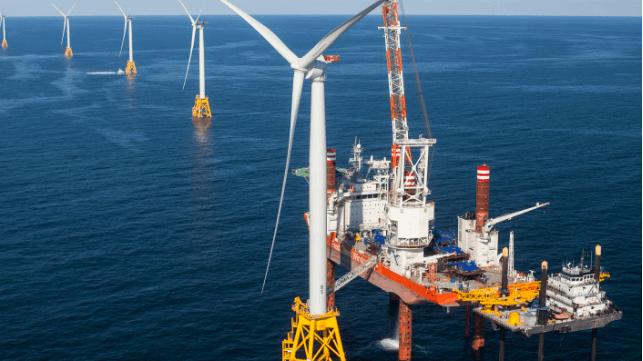Ørsted and States File Lawsuits to Stop Trump’s Attack on Offshore Wind

The showdown between the Trump administration and the offshore wind industry is heading to U.S. District Court as the administration continues to step up its assault on the industry. Ørsted, developer of Revolution Wind, filed suit Thursday morning, September 4, in the District of Columbia, and shortly thereafter after Connecticut and Rhode Island also filed suit in Rhode Island seeking to vacate the stop work order for the Revolution Wind project, even as it came out that the administration is now targeting Avangrid’s New England offshore wind project.
Revolution Wind, which is a partnership between Ørsted and BlackRock’s Global Infrastructure Partners, had completed 80 percent of its installation when the Department of the Interior issued a stop-work order in late August. Since then, the administration has said in lawsuits it is also planning to act to rescind the permits issued to US Wind for its Maryland offshore project, Massachusetts’ SouthCoast Wind, and, in a court filing on Wednesday, September 3, New England Wind, which is being developed by Avangrid, a subsidiary of Spain’s Iberdrola.
In the DC District Court filing, Ørsted calls the administration’s action “arbitrary and capricious.” It contends the administration’s order was issued without statutory authority and does not follow regulations and procedures.
It is asking the court to immediately vacate the stock-work order. It says time and money were invested in the approval process, and now billions of dollars were spent “in reliance on these valid approvals.” The company called the filing a “necessary step,” while saying it was continuing to seek a resolution with the administration.
In the spring, Norway’s Equinor had threatened legal action but stopped short when the Trump administration also issued a stop-work order for its Empire Wind project. The order was lifted after about a month, and behind-the-scenes deals with New York State. The Norwegian government had also pressured the administration. Ørsted is partially owned by Denmark, but it is unclear if the country will also intervene on the company’s behalf.
The attorneys general of Connecticut and Rhode Island said there was “zero justification” for the administration’s actions. “This kind of erratic and reckless governing is blatantly illegal, and we’re suing to stop it,” said Connecticut Attorney General William Tong.
The Trump administration has given multiple reasons for stopping the projects, ranging from “national defense concerns” to allegations that the Biden administration rushed the review process. Ørsted, in its suit, notes that the Department of Defense previously cleared Revolution Wind to proceed. Trump has alleged that “windmills” are not economical without federal aid and won approval to stop tax credit programs, and is now withdrawing grants given to ports for infrastructure investments to aid the industry.
Attorney General Tong told the press that the Trump administration is waging “all-out war” on wind power. The administration confirmed that saying it was enlisting support from all its agencies for a coordinated effort to stop the programs.
A White House spokesperson responded today to questions about the actions against the projects, saying they had received “unfair, preferential treatment” from the Biden administration. BOEM, during the last administration, approved 11 commercial-scale offshore wind projects and had a schedule for additional auctions. The Trump administration put the process under review and froze future auctions and leases.

that matters most
Get the latest maritime news delivered to your inbox daily.
The administration’s review of the wind industry lease process is also being challenged in court. States’ attorneys general filed suit in May to challenge the executive order and end the delays for offshore wind projects.
New England Wind also received its approvals in 2024 for a two-phase project located about 30 miles off the coast of Massachusetts. The project, which was expected to start construction this year, would provide 1870 MW and was expected to be operational by 2029. The Department of Justice said on Wednesday it would act by October 10 to vacate the approval of the project’s Construction and Operations Plan.
